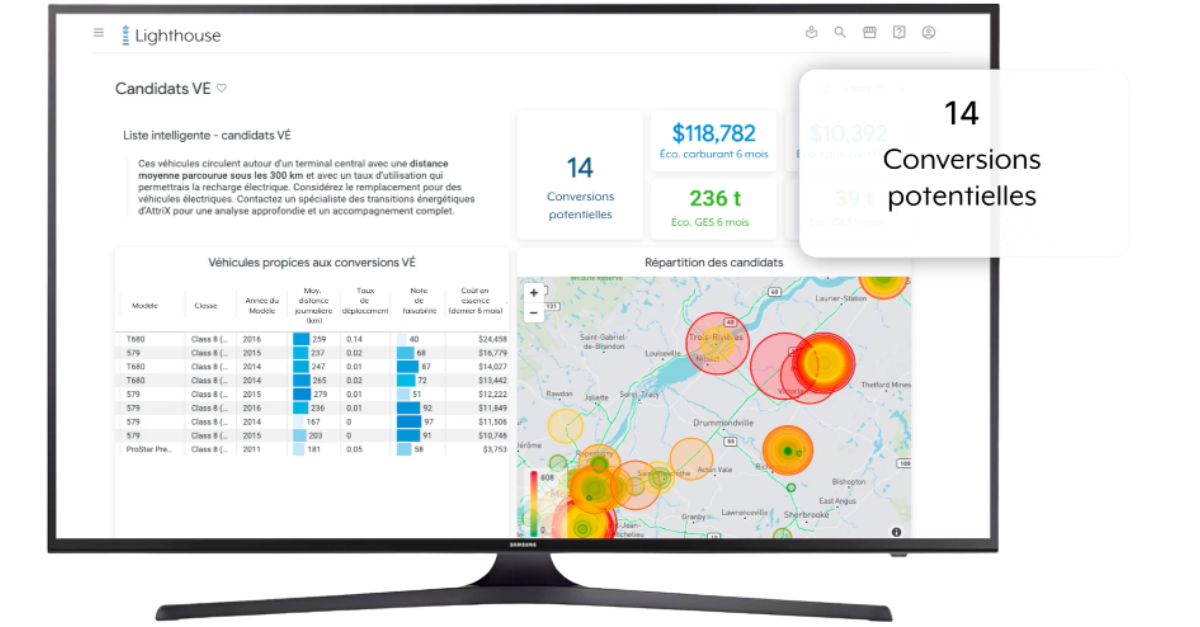Commercial Fleet Management: Strategies, Tools & Tips
Commercial fleet management plays a vital role in keeping businesses running smoothly, especially in industries like transportation, logistics, and...
Keep an eye on the road
Simplify your driver's routine
For efficient decision making
Ensure the compliance of your fleet
Simplify the daily life of your drivers
Maximize the value of your data
Unparalleled monitoring of your assets
The friendly competition that pays off
Planning powered by data
Exceed your customers' expectations
Provide better service to your users
Maximize the satisfaction of your citizens
Simplify your daily life on the construction site
Facilitate the electrification of your fleet
Our experts meet your needs
Easily meet the standards
Improve the safety of your drivers
Protect your data and your fleet
5 min read
AttriX
Jun 15, 2024 1:02:00 PM
.png)
Fleet management is key to any transport and logistics operation. Fleet management is important for ensuring smooth fleet operations, optimizing route planning, fuel cost, and overall fleet efficiency. Central to this efficiency is the implementation of a robust Control Center, a sophisticated hub designed to streamline and enhance various aspects of fleet oversight. By leveraging advanced technologies for real-time data visualization, automated compliance, and predictive maintenance, Control Centers empower fleet managers to make informed decisions, optimize resource allocation, and ensure regulatory adherence. This comprehensive guide explores the transformative impact of Control Centers on modern fleet management, highlighting their essential features, benefits, and future potential.
A Control Centre in fleet management is a centralized system to manage and control all aspects of fleet operations. It brings together multiple technologies and data sources to provide monitoring and control. The key features of a Control Centre are:
Centralized Monitoring: It consolidates data from all fleet vehicles into a single interface, allowing managers to monitor vehicle locations, statuses, and performance metrics in real-time.
Operational Management: It facilitates the management of daily fleet operations, including route planning, dispatching, and scheduling. This ensures that vehicles are utilized efficiently and tasks are assigned optimally.
Compliance and Safety Management: The Control Center tracks regulatory compliance, such as Hours of Service (HOS) and maintenance schedules, ensuring that the fleet adheres to all legal requirements and safety standards.
Data Analytics and Reporting: It provides powerful analytics tools that transform raw data into actionable insights. Managers can generate reports on fuel consumption, driver behaviour, maintenance needs, and more, helping to identify trends and make informed decisions.
Communication Hub: The Control Center serves as a communication hub, enabling real-time communication between fleet managers, drivers, and other stakeholders. This improves coordination and response times in case of emergencies or changes in plans.
Predictive Maintenance: Utilizing advanced algorithms and machine learning, the Control Center can predict maintenance needs before they become critical, reducing downtime and extending the lifespan of vehicles.
Security and Asset Protection: It enhances the security of fleet assets through GPS tracking, geofencing, and real-time alerts for unauthorized use or deviations from planned routes.
Customization: Users can customize the control center by adding, organizing, and removing controls to suit specific operational needs.
Accessibility: Instructions on how to open the control center on various devices provide quick access to essential controls and data.
Overall, a Control Centre is key to modern fleet management, a complete solution to improve efficiency, safety and compliance across all fleet operations.

An effective Control Centre has real-time data visualization to provide instant insights into fleet operations, so you can act proactively. The Control Center icon on the menu bar provides quick access to the Control Center. Automated compliance management to ensure compliance with regulations without manual intervention. Asset tracking to continuously monitor vehicle locations and conditions to optimize resource allocation. Business intelligence dashboards to drill down into operational trends like fuel consumption and driver behaviour. The use of fleet management software helps analyze these trends and improve fleet efficiency. And seamless communication and coordination to improve overall operational efficiency and response times.
Using a Control Centre in fleet management has many benefits, it increases overall efficiency and productivity. Real-time monitoring and decision-making mean fleet operations are always optimized. Automated compliance tracking reduces the risk of legal issues and improves safety standards. Predictive maintenance minimizes vehicle downtime and extends asset life. A fleet management system can help streamline vehicle acquisition, maintenance, and driver management. The importance of vehicle maintenance in reducing downtime and extending the lifespan of fleet vehicles cannot be overstated. It provides valuable data insights so managers can make informed decisions to reduce operational costs and improve fuel efficiency. Improved communication and coordination between team members means faster response times and better resource allocation, ultimately improving the overall performance and profitability of the fleet.
Real-time data is key in fleet management as it provides visibility and responsiveness to all operational aspects. Instant access to information means managers can detect and address issues like route deviations, maintenance requirements and driver behaviour anomalies as they happen. For example, real-time monitoring can highlight HOS violations so you can take action to avoid fines and keep drivers safe. Vehicle tracking plays a crucial role in ensuring driver safety and monitoring vehicle performance using GPS technology. Real-time data also enables proactive decision-making, to optimize fleet efficiency and reduce downtime, overall improving operational performance. Additionally, real-time data can be used to optimize fleet performance by overseeing all aspects of fleet operations and maintenance.
Business intelligence in a Control Centre uses telematics data to provide deep insights into fleet operations so managers can make data-driven decisions. It includes fuel consumption patterns, driver behaviour and inefficiencies. Fleet management systems provide insights into vehicle metrics, maintenance, and driver management. This analysis helps to optimize routes, reduce idle time and improve overall fuel efficiency. Fuel management is crucial in identifying cost-saving solutions and improving fuel efficiency. Trend analysis looks at long-term patterns like seasonal fuel price fluctuations and maintenance needs. By understanding these trends fleet managers can anticipate future challenges and opportunities and improve operational planning and strategic decision making. Advanced analytics tools and dashboards provide visibility to this data so fleet managers can act on it.
.png?width=1554&height=380&name=test-lighthouse_logo_noir%20copie%20(1).png)
The Lighthouse Control Center by AttriX is an advanced fleet management solution designed to provide comprehensive oversight and optimization of fleet operations. It integrates cutting-edge technology to deliver real-time data visualization, compliance management, and asset tracking. Key features of the Lighthouse Control Center include:
Business Intelligence Dashboards: These dashboards offer in-depth analysis of telematics data, helping managers make informed decisions based on trends in fuel consumption, driver behavior, and more.
Real-Time Alerts: The system provides immediate notifications for critical issues such as Hours of Service violations, maintenance needs, and unauthorized vehicle use, allowing for prompt action to prevent operational disruptions.
Automated Scheduling and Secure Content Delivery: The Lighthouse Control Center supports automated scheduling to ensure continuous operation and secure content delivery, facilitating efficient and reliable fleet management.
Integration with Samsung Smart Signage Displays: This plug-and-play feature allows for easy setup and operation, enabling managers to visualize data and monitor fleet activities effectively.
GHG Emission Reduction and Cost Savings: The platform helps fleets achieve environmental and economic goals by optimizing fuel usage, reducing greenhouse gas emissions, and identifying cost-saving opportunities.
Support for Electric Vehicles (EVs): The Lighthouse Control Center assists fleets in transitioning to electric vehicles by analyzing potential savings and operational impacts, and promoting sustainable fleet management practices.
Fleet management companies can use the Lighthouse Control Center to leverage vehicle telematics and software to optimize fleet operations, reduce costs, and improve efficiency. Additionally, the Lighthouse Control Center can be used to manage commercial vehicles, enhancing service delivery and maintenance for public fleets such as governments and schools.
By leveraging the Lighthouse Control Center, fleet managers can enhance productivity, ensure regulatory compliance, and achieve significant cost and environmental benefits, making it an indispensable tool for modern fleet management.
Centralized Monitoring and Control: A Control Center offers a unified platform to monitor and manage fleet operations, enhancing overall efficiency and responsiveness.
Enhanced Decision-Making: Real-time data and advanced analytics empower managers to make informed decisions, optimizing routes, and resource allocation.
Regulatory Compliance: Automated tracking of compliance-related data ensures adherence to legal standards, reducing the risk of violations and penalties.
Operational Efficiency: By integrating various tools and systems, Control Centers streamline operations, from dispatching to maintenance, improving productivity and reducing costs. Additionally, a Control Center can streamline vehicle acquisition and maintenance processes, enhancing overall fleet productivity.
Predictive Maintenance and Security: Advanced algorithms predict maintenance needs, minimizing downtime, while real-time tracking and alerts enhance asset security.
Environmental and Cost Savings: Optimized fuel consumption and reduced greenhouse gas emissions contribute to sustainability, while cost-saving measures enhance profitability.

Commercial fleet management plays a vital role in keeping businesses running smoothly, especially in industries like transportation, logistics, and...

In fleet management, fleet compliance services play a much bigger role than just checking a box. They’re about keeping your drivers safe, your...

Trucking has always come with its fair share of challenges, from road safety and liability issues to managing fleet efficiency. As the industry...